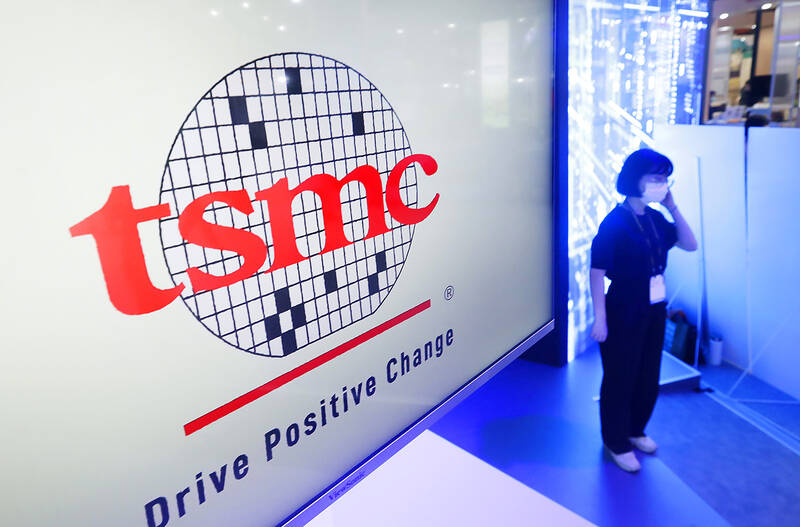Foreign brokerages gave mixed reactions after Taiwan Semiconductor Manufacturing Co (TSMC, 台積電) cut its capital expenditure budget for this year by about 10 to 18 percent, due to short-term market uncertainty.
TSMC during an investors’ conference on Thursday reduced its capital expenditure forecast to US$36 billion from an earlier estimate of US$40 billion to US$44 billion.
A European brokerage said it expects the figure to fall further to US$34 billion next year.

Photo: Chiang Ying-ying, AP
The chipmaker’s announcement came as the sector tackles weak global demand due to ongoing inventory adjustments and central banks raising key interest rates to fight fast-growing inflation.
TSMC said it expects capacity utilization for its 6-nanometer and 7-nanometer processes to slow down in the fourth quarter of this year.
The weakness is likely to extend into the first half of next year, due to falling demand for smartphones and PCs, and delayed product launches by customers, it said.
The European securities house said that Washington’s ban on US chip exports to China would drag down TSMC’s sales by 1 to 2 percent next year.
A US securities firm said the chipmaker’s reduction of capital expenditure confirms the presence of significant uncertainties ahead.
Another US brokerage said that it agrees with TSMC’s assessments on the possible effects of the export ban and that ongoing inventory adjustments in the global semiconductor industry would continue until the first half of next year.
TSMC has said it expects inventory levels to return to normal in the second half of next year.
A Japanese brokerage said that it was impressed by TSMC’s third-quarter results after the chipmaker posted NT$280.87 billion (US$8.8 billion) in net profit, or earnings per share of NT$10.83.
Although weakening demand is expected to reduce the company’s capacity utilization in the first half of next year, it is still likely to outperform its peers, the Japanese brokerage said.
Separately, the US International Trade Commission on Friday said that it would investigate TSMC over accusations that it infringed on patents held by New York-based Daedalus Prime LLC.
The commission would also investigate South Korea’s Samsung Electronics Co and US-based IC designer Qualcomm Inc on two separate complaints filed with the agency by Daedalus Prime on Sept. 13.
Daedalus Prime has accused the three companies of contravening Section 337 of the US Tariff Act of 1930 by importing and selling in the US integrated circuits and mobile devices covered by its patent, the agency said.
The probe would cover Samsung’s Galaxy S20 FE and Galaxy A71 5G smartphones, tablet computers and smart watches, as well as components including chips produced by TSMC for Qualcomm, US media have reported.
Intel Corp developed the patents in question, which Daedalus Prime then obtained, the reports said.
The agency is also investigating patent infringement claims made by Daedalus Prime against Mercedes-Benz USA LLC, NXP USA Inc and Avnet Inc.

Taiwan Semiconductor Manufacturing Co (TSMC, 台積電) would not produce its most advanced technologies in the US next year, Minister of Economic Affairs J.W. Kuo (郭智輝) said yesterday. Kuo made the comment during an appearance at the legislature, hours after the chipmaker announced that it would invest an additional US$100 billion to expand its manufacturing operations in the US. Asked by Taiwan People’s Party Legislator-at-large Chang Chi-kai (張啟楷) if TSMC would allow its most advanced technologies, the yet-to-be-released 2-nanometer and 1.6-nanometer processes, to go to the US in the near term, Kuo denied it. TSMC recently opened its first US factory, which produces 4-nanometer

GREAT SUCCESS: Republican Senator Todd Young expressed surprise at Trump’s comments and said he expects the administration to keep the program running US lawmakers who helped secure billions of dollars in subsidies for domestic semiconductor manufacturing rejected US President Donald Trump’s call to revoke the 2022 CHIPS and Science Act, signaling that any repeal effort in the US Congress would fall short. US Senate Minority Leader Chuck Schumer, who negotiated the law, on Wednesday said that Trump’s demand would fail, while a top Republican proponent, US Senator Todd Young, expressed surprise at the president’s comments and said he expects the administration to keep the program running. The CHIPS Act is “essential for America leading the world in tech, leading the world in AI [artificial

REACTIONS: While most analysts were positive about TSMC’s investment, one said the US expansion could disrupt the company’s supply-demand balance Taiwan Semiconductor Manufacturing Co’s (TSMC, 台積電) new US$100 billion investment in the US would exert a positive effect on the chipmaker’s revenue in the medium term on the back of booming artificial intelligence (AI) chip demand from US chip designers, an International Data Corp (IDC) analyst said yesterday. “This is good for TSMC in terms of business expansion, as its major clients for advanced chips are US chip designers,” IDC senior semiconductor research manager Galen Zeng (曾冠瑋) said by telephone yesterday. “Besides, those US companies all consider supply chain resilience a business imperative,” Zeng said. That meant local supply would

Servers that might contain artificial intelligence (AI)-powering Nvidia Corp chips shipped from the US to Singapore ended up in Malaysia, but their actual final destination remains a mystery, Singaporean Minister for Home Affairs and Law K Shanmugam said yesterday. The US is cracking down on exports of advanced semiconductors to China, seeking to retain a competitive edge over the technology. However, Bloomberg News reported in late January that US officials were probing whether Chinese AI firm DeepSeek (深度求索) bought advanced Nvidia semiconductors through third parties in Singapore, skirting Washington’s restrictions. Shanmugam said the route of the chips emerged in the course of an